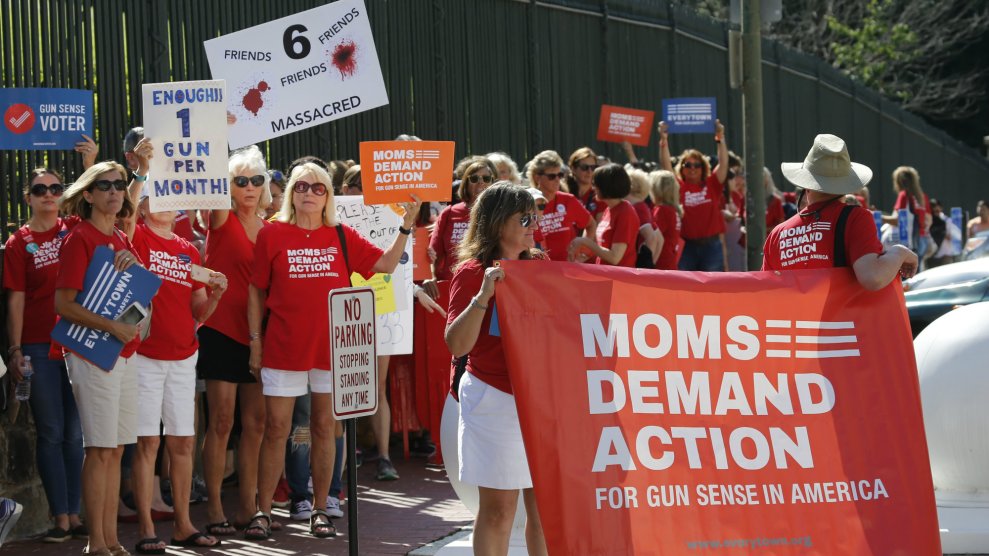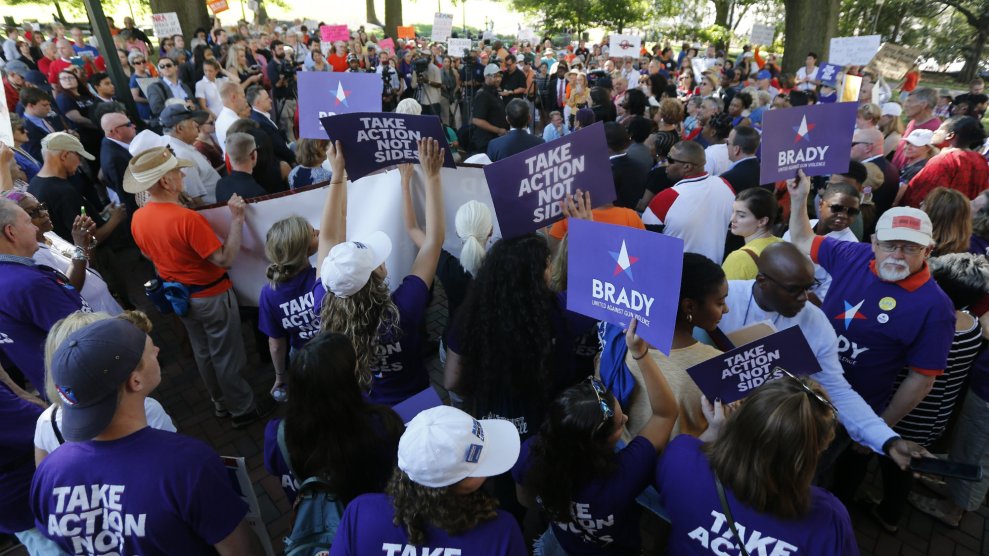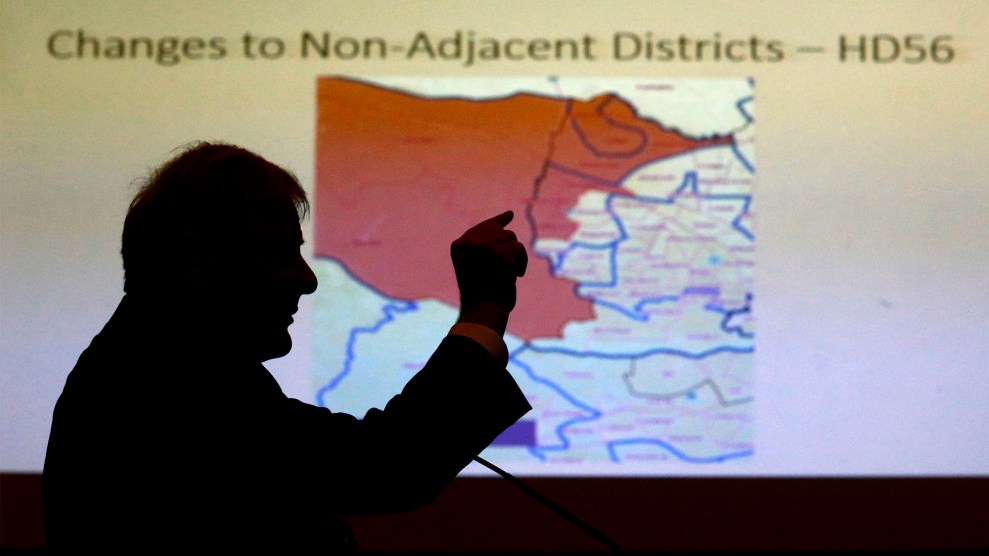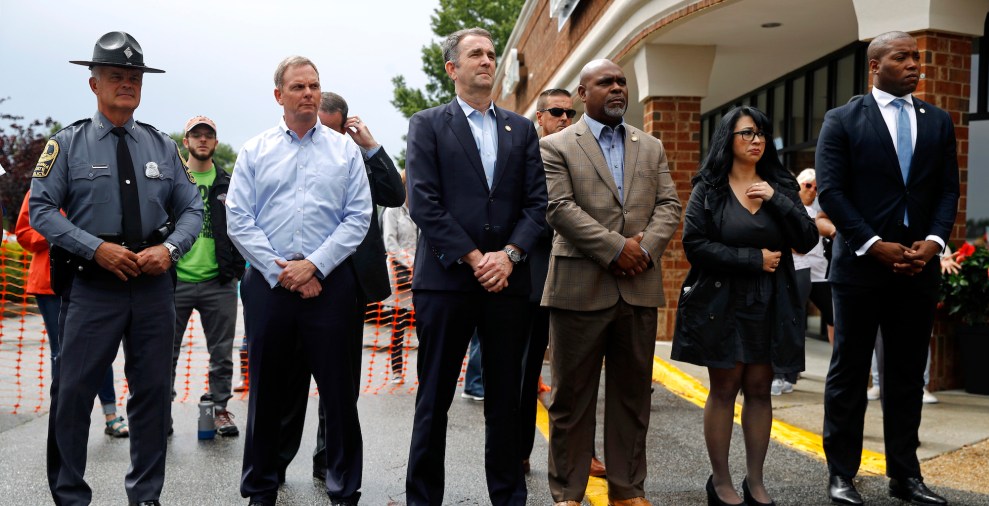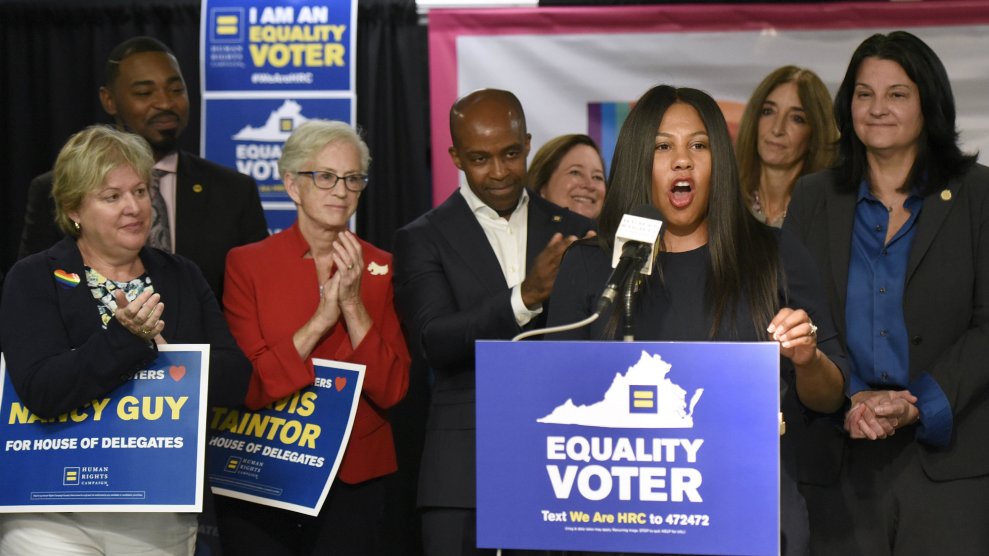
Sheila Bynum-Coleman, the Democratic candidate running against Virginia House Speaker Kirk Cox, speaks at a news conference hosted by the Human Rights Campaign on August 15, 2019.Steve Ruark/AP Images for HRC
Sheila Bynum-Coleman is nervous and running late. It’s just before 5 p.m. on a sticky summer evening late in August when we pull up in front of her modest suburban house in Chesterfield, Virginia. “I need a few minutes!” Bynum-Coleman tells Rob Silverstein, her 28-year-old campaign manager, when he calls to say we’re outside. He turns to me after hanging up. “It’s okay to be a little late to your own fundraiser,” he says. “Make an entrance.”
A month earlier, Bynum-Coleman, 47, made her entrance into the political spotlight when national political groups jumped into Virginia’s upcoming statehouse elections with a slew of endorsements and millions of dollars in campaign contributions, including more than $250,000 to her campaign. State elections aren’t usually thrust into the national political conversation—especially in an off-year election when there are no presidential or congressional races—but the upcoming ones in Virginia carry a lot of added weight: If Democrats win control of the state’s legislature, it would be the first time the party controlled the full government since 1993. What voters decide in November won’t just shape the state’s political future for the next decade, but could give the country a hint as to what might happen in the 2020 presidential election. Because of the timing and political history of Virginia’s state elections, analysts often see the state as a political indicator for where the country might go next. And in the wake of several mass shootings this year, the debate over gun control has become a leading issue for voters nationwide and reshaped the political implications of many national and local campaigns. That’s especially true in Virginia, where a shooter entered a municipal building in Virginia Beach in May and killed 12 people.
And at the center of it all is Bynum-Coleman, a real estate agent, developer, and mother of five who has made gun control a central message in her campaign against the most powerful Republican in the state, Kirk Cox.
As speaker of the GOP-controlled House, the 62-year-old Cox, who has represented Virginia’s 66th District since 1990, has thwarted Virginia Democrats’ push to pass several pieces of progressive legislation—even ones with bipartisan support. He’s kept the state’s Equal Rights Amendment in legislative purgatory, blocked measures to ban housing and workplace discrimination for LGBTQ residents, and opposed raising the state’s minimum wage. And in a move that reinforced Bynum-Coleman’s decision to run against him, he prevented gun control legislation from passing.
Strengthening gun control laws has long been an uphill climb for Virginia Democrats. The state is home to the National Rifle Association, whose vast financial influence in American politics was on full display during Donald Trump’s presidential campaign. Historically, the NRA hasn’t had to flex its political muscle much in the Old Dominion state, but that all changed after the Virginia Beach shooting. A month after the shooting, Democratic Gov. Ralph Northam convened a special session to pass gun control legislation, but the session lasted all of 90 minutes after the Republican majority of the Assembly—with Cox at the helm—voted to adjourn the session without passing any gun control measures. All day long, the NRA was there, posted up inside Cox’s office.
But now Cox’s reign is under threat. Not just by Bynum-Coleman’s ability to attract more national support than a typical state-level campaign—she’s raised more than a million dollars (though trails Cox’s haul of $1.5 million) and received endorsements from organizations like Moms Demand Action, Brady United Against Gun Violence, the Human Rights Campaign, and EMILY’s List—but because the state’s previous legislative boundaries were tossed out by federal courts due to racial gerrymandering, a decision recently reaffirmed by the Supreme Court. For Cox’s district, that’s meant a big shift of voters from predominantly white and Republican Richmond suburbs to the more racially and politically diverse communities of Wilkinson Terrace, Matoaca, and Bynum-Coleman’s community of Chesterfield. Using data from the US Census Bureau and the Virginia Division of Legislative Services, the Virginia Public Access Project—a nonpartisan data organization dedicated to Virginia politics—predicts a 32-point shift in Cox’s district, pushing it to 53.2 percent Democratic voters and 46.8 percent Republican.
It is one of six GOP districts that have been redrawn to benefit Democrats, threatening to erase the GOP’s three-seat majority in the House. Cox is feeling the heat: For the first time in decades, he took to the debate stage to convince voters that he should stay in office. “We have gotten to where we are in Virginia, I think, because of very balanced, sound policies,” Cox said during the debate, where he avoided directly answering questions about gun control legislation and climate change. “It’s the Republican majority that’s trying to keep those.”
The aspiration among the state’s well-heeled Democrats to undo that majority was palpable and optimistic at Bynum-Coleman’s August fundraiser, which she eventually arrived at as stragglers were rushing to check in. The venue, in a posh clubhouse in a neighboring district, was packed with dozens of Democratic fundraisers eager to mingle with their party’s new rising star. Bynum-Coleman represents the new face of the state’s resurgent Democratic Party—a young black woman who entered the political arena because she was fed up by a lack of progress she was seeing in her community.
“I’m running against the most powerful Republican in the state of Virginia, and this election is going to impact people’s lives,” Bynum-Coleman said with calm confidence. “There’s some nights I can’t sleep. When I knock on people’s doors and they tell me they need me to win, that’s not something I take lightly. That’s big to me.”
The push to strengthen Virginia’s gun control laws is at the center of the state’s shifting political identity, and there’s a lot of hope that these legislative elections will reflect that. According to a recent Washington Post–Schar School poll, gun policy is the top issue for Virginia voters. Other statewide polls show strong bipartisan support for passing gun control measures, including universal background checks, limits on concealed carry, and a ban on assault-style weapons. A poll last year found that 54 percent of voters thought it was more important to control who can buy guns than to protect the rights of gun owners.
“The politics of guns in Virginia is a powerful example of how the state’s political culture has changed very rapidly,” says Stephen Farnsworth, a political science professor at the University of Mary Washington in Fredericksburg, Virginia. For decades, he says, Democrats wouldn’t talk about gun control outside of the bluest urban districts because of NRA’s political influence in the state.
But support for gun control has slowly increased in the state since the mass shooting on the campus of Virginia Tech in April 2007 and intensified greatly in the wake of the Virginia Beach shooting. “If the public is moving in a certain direction, you as a politician would be unwise to ignore it,” Farnsworth says.
For Bynum-Coleman, the gun control push is personal. In 2016, her daughter was shot at a party when an argument between two people led to an exchange of gunfire. She survived and made a full recovery, but the experience seriously shook Bynum-Coleman. “Just imagine getting a call in the middle of the night that your child has been shot,” she says with shaky breath when I ask her about the incident. “It was a very traumatic experience.” Earlier, her cousin was shot 23 times in two separate incidents. “Just seeing the gun violence in my community, it’s always been a concern,” she says. “Never knew what I could personally do about it—I just wanted to see something change.”
It’s no coincidence that the NRA set up shop in Virginia in 1993. For decades, the state has been home to some of the loosest gun control laws in the country. That was especially true before 1993, when the state passed a law limiting the number of handguns an individual could purchase in a month. “People would come to Virginia,” Randy Rollins, the former secretary of public safety under Gov. Doug Wilder, told Virginia Public Media earlier this summer. “They could go to a gun dealer. Buy 25, 30 weapons, put them in the back of their car, take them to DC.” That law was repealed in 2012 by the state’s GOP-controlled legislature and Gov. Bob McDonnell, a Republican who had voted to approve the original law when he was a member of the state’s House in the ’90s.
In recent years, the GOP-led legislature in Virginia, with Cox at the helm, has used its narrow majority to thwart any gun control legislation. In the aftermath of the Virginia Beach shooting, Cox and his fellow Republicans pulled a Mitch McConnell at the special session and refused to vote on any of the gun control bills introduced by both Democrats and Republicans, ending the proceedings after just 90 minutes.
Outside the Virginia State Capitol in Richmond on the morning of the session, Bynum-Coleman joined hundreds of gun control activists demonstrating outside. She was energized by the size of the crowd gathered in the sweltering July heat to demand gun control laws, which far outnumbered the pro-gun contingent, she recalls. But inside the Capitol, a conference room in Cox’s office turned into a de facto war room for NRA officials, who strategized about counter-protest efforts and distributed hundreds of t-shirts and hats to pro-gun demonstrators. Virginia Democrats were stunned by Cox’s move to end the session after just 90 minutes, but the NRA had spent weeks guiding the GOP leadership on how to handle the session, the Washington Post reported. Virginia voters may want tight gun control laws, but the NRA’s grip on the state’s GOP leadership is tighter. So far this election cycle, the NRA—amid its myriad financial struggles and internal turmoil—has spent $273,000 to help state Republicans stay in control, according to VPAP, much more than it has in any previous state election cycle.
The issue of gun control isn’t just a leading concern for the Virginia state elections, but for the upcoming 2020 presidential election, and many national political groups are looking at Virginia as a bellwether. To that effect, national gun control groups have spent a historic amount of money in Virginia. Everytown for Gun Safety has pumped $2.5 million into the state’s 2019 elections, while Giffords, the gun violence prevention research and advocacy group co-founded by former Arizona Congresswoman Gabby Giffords, just launched a $300,000 digital ad campaign to help its endorsed candidates—including Bynum-Coleman—get elected. Cox, through his political action committee, has received $1,500 from the NRA thus far.
Cox and his GOP colleagues’ control of the Virginia legislature was by design. The oldest legislative body in the Western Hemisphere has ping-ponged back and forth between the two parties for decades, but for the past 20 years, the GOP has controlled its House of Delegates. The state went for Hillary Clinton in the 2016 presidential election by more than 5 points, but in the 2017 midterms, Republicans barely held onto the House because of a race that was so close the winner’s name was literally drawn out of a hat.
Democrats in the state had a banner year in 2017, but they probably would have gained more seats had it not been for the gerrymandered maps that Republicans passed in 2011. Though Democrats won the statewide vote for the Assembly by 9 points in 2017, Republicans narrowly maintained control of the body because of district lines that packed majority-black parts of Richmond and Hampton Roads into overwhelmingly Democratic districts. But in 2018, after a years-long court battle, a federal court ruled that the Assembly map was unconstitutionally racially gerrymandered and ordered that 11 districts be redrawn, including Cox’s district.
Cox didn’t take the ruling lightly. “The modules selected by the Court target senior Republicans, myself included, without a substantive basis in the law,” he said at the time. “We are confident that the Supreme Court will not allow the remedial map the court appears to be on its way to adopting to stand.” It did, in a 5–4 ruling.
And so, as the Virginia heads into the next redistricting cycle in 2021, the future of Virginia’s legislative maps—and the state’s politics—for the next decade lies in how well the Democratic candidates in those redrawn districts fare on November 5.
With gun control at the center of the political debate, Virginia’s elections have come to be seen as a sort of referendum ahead of 2020, and it has drawn outsize attention. Progressive political groups continue to funnel millions of dollars to Democratic candidates in tight races, and celebrities like Alec Baldwin, Julia Louis-Dreyfus, Debra Messing, and Mark Ruffalo have endorsed candidates in swing districts. And Bynum-Coleman has made the issue central to her campaign. In late September, Everytown produced a television ad for Bynum-Coleman that pulled no punches in criticizing Cox’s relationship with the NRA: “Kirk Cox cares more about the gun lobby than our families.”
That’s the message she’s been repeating on the fundraising circuit, where people always introduced her with some version of “the future of the Virginia Democratic Party.” At several fundraisers I attended—near her home district in Virginia and in Washington, DC—she told the same stories. How her son with a learning disability struggled to get resources at school, prompting her first run for the state House in 2015. The myriad challenges she’s faced as a black woman. But the one that always elicited dead silence and solemn stares is when she recalls the horror of getting a phone call in the middle of the night that her child has been shot. And then she would follow up the story with the same talking points about how important it is for Virginia to pass stronger gun control laws and how shameful it was that her opponent punted on doing so. And every time she brought it up, her audiences sternly shook their heads in agreement.

